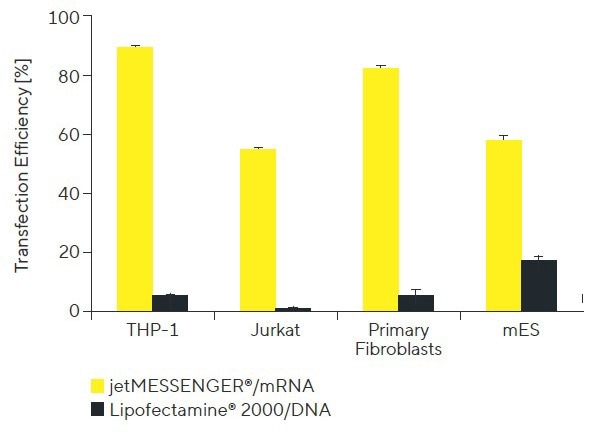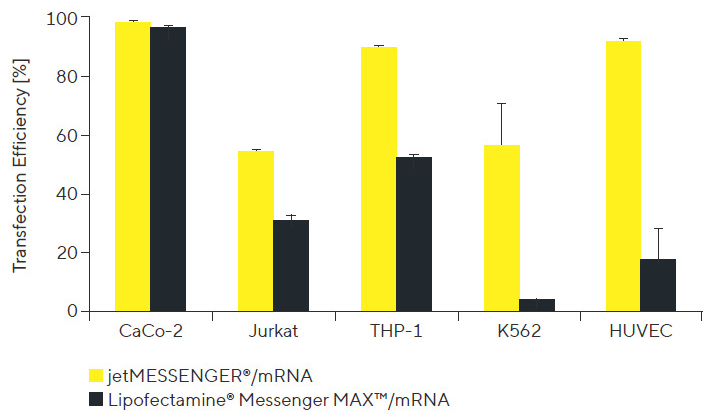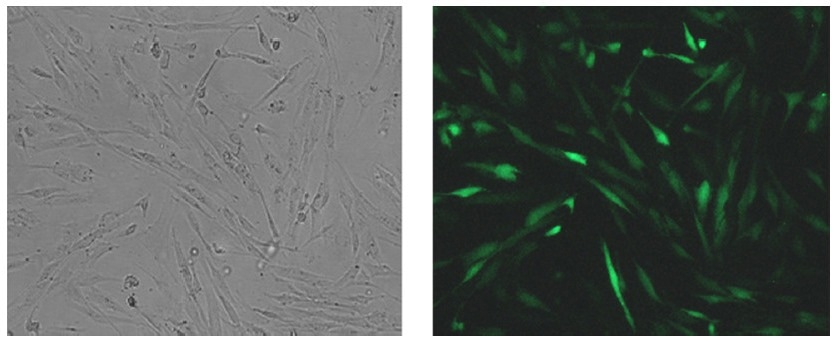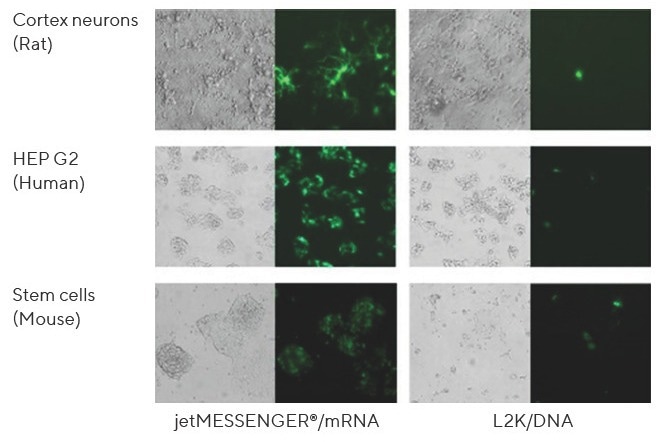jetMESSENGER® is an innovative and potent transfection reagent designed to achieve high mRNA transfection efficiency in easy and hard-to-transfect cells, including primary cells, cancer cell lines, neurons, and stem cells. jetMESSENGER® transfection requires very little mRNA and a small amount of reagent, which results in very little cytotoxicity.
Available sizes
- jetMESSENGER® 0.75 mL
- jetMESSENGER® 0.1 mL
Capabilities
Outperforms DNA transfection
jetMESSENGER® is a highly effective and gentle mRNA transfection reagent. mRNA transfection offers several advantages over DNA transfection:
- There is no chance of genome integration, so the transfected cell's genome is unaltered.
- No promoter regulation issue
- Reaching the nucleus is not necessary for effective expression.
- A gentler procedure

Image Credit: Sartorius Corporation
Allows higher gene expression than main competitors on a variety of cell lines
Compared to other mRNA transfection reagents, jetMESSENGER® is incredibly effective, particularly in cells that are difficult to transfect. Excellent mRNA delivery is achieved through transfection with jetMESSENGER® in a broad range of cell lines, including neurons, primary cells, stem cells, and different cancer cell lines.

Image Credit: Sartorius Corporation
Suitable for different applications
Gene expression, CRISPR/Cas-9 gene editing, fibroblast and stem cell reprogramming studies, and immunotherapy assays are just a few of the uses for jetMESSENGER®.

Image Credit: Sartorius Corporation
Extremely gentle on cells
JetMESSENGER® enables the transfection of quiescent and slowly dividing cells by removing the necessity of traveling to the nucleus for effective expression. Additionally, jetMESSENGER® uses a very gentle method of operation. During transfection, cell morphology is preserved and cell viability stays incredibly high.

Image Credit: Sartorius Corporation
Overview
jetMESSENGER® is a highly effective and mild mRNA transfection reagent. It has been specially created to provide exceptional transfection efficiency in cells that are typically challenging to transfect, including stem cells, primary cells, cancer cell lines, and neurons. They can also be applied to many different types of cells that are simple to transfect.
However, jetMESSENGER® transfection has very low cytotoxicity as it requires minimal amounts of mRNA and reagent volumes. It is also ideal for immunotherapy assays, stem cell differentiation, iPS production, gene expression, and CRISPR gene editing.
Key benefits
- High-efficiency transfection: Maximum gene expression on a broad range of cells that are difficult to transfect
- Keeps cell integrity: Incredibly gentle on cells.
- Cost saving: Minimal volumes of reagent and mRNA are needed.
- Outperforms DNA transfection: Reaching the cell nucleus is not necessary.
Specifications
Source: Sartorius Corporation
| . |
. |
. |
| Applications |
Application |
- Gene expression
- Genome Editing
- Stem cell differentiation
- Reprogramming
- Immunotherapy
|
| Cell Type |
- Hard-to-transfect cells
- Adherent and suspension cells
- Primary cells (Neurons, Stem cells, Immune cells, fibroblasts, …)
- Post-mitotic cells
|
| Biological Information |
Buffer Size |
60 mL |
| Molecule delivered |
mRNA |
| Number of transfections |
1.5 ml of jetMESSENGER® transfection reagent is sufficient to perform up to 1500 transfections in 24-well plates or 375 transfections in 6-well plates |
| General Specifications |
Amount of Reagent |
jetMESSENGER® 0.75 mL |
| Reagents and Kits Type |
jetMESSENGER® |
| Product Information |
Provided With |
mRNA buffer |
| Storage Conditions |
Storage Conditions |
5 °C ± 3 °C |